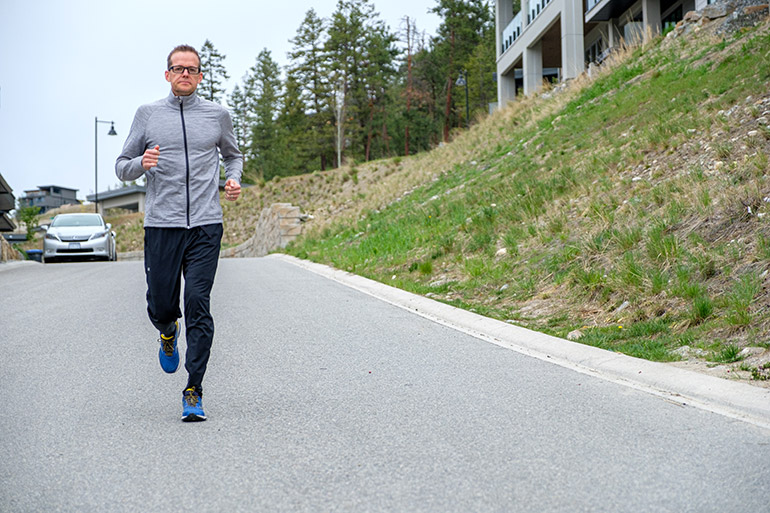
UBCO Associate Professor Jonathan Little discusses how just the right amount of exercise can help build immunity.
UBCO professor provides exercise guidelines during COVID-19
By now, everyone has read some guidelines on how to stay healthy while living with the COVID-19 stay-at-home policy. Tips include keeping a routine, eating well, not staying up too late and getting exercise regularly. But how much exercise? And is there such a thing as too much exercise?
UBC Okanagan Associate Professor Jonathan Little, who conducts research with the School of Health and Exercise Sciences, answers some of these questions.
Can getting regular exercise really increase my immunity? If so, how?
Being inactive is linked to poor metabolic and psychological health and a less functional immune system. Most people know that regular exercise can improve markers of metabolic or psychological wellbeing, but what is less appreciated are the effects of exercise on the immune system.
Working through multiple pathways, research shows that the right amount of exercise can boost immunity.
If I’m eating properly, and getting the right amount of sleep, do I really need to exercise?
That’s a great question. Certainly, eating healthy and sleep are very important for overall health. But I think the evidence showing how exercise has such wide-ranging health benefits, including improving our immune system, suggests that our bodies have evolved to function optimally when we are regularly active. So, I don’t think anything can substitute for regular physical activity when it comes to optimizing health.
Is there such a thing as too much exercise?
We can think of exercise as medicine for boosting our immune function; too little and we have no effect but too much might actually be bad. There is evidence that after extreme exertion, like a marathon or very strenuous bout of prolonged exercise, our immune cells don’t work as well to fight off infections.
Finding the sweet spot right now by engaging in regular moderate exercise is probably the best approach.
With all this extra time people have these days, is now a good time to train for a marathon or CrossFit competition?
You don’t want to be inactive but it’s probably also not the best time to be tripling your regular exercise routine because you have extra time on your hands.
I wouldn’t discourage anyone from creating a realistic goal or new challenge but using some common sense, increasing your mileage or minutes moderately, and keeping within your limits is best right now. We also don’t know when races or competitions are going to start up again so that probably should come into consideration.
The gyms are all closed. What should people be doing to keep themselves fit? And sane?
If you are a regular gym-goer and can’t keep up with your routine, I think now is the time to try out some different activities like hiking, jogging, cycling and bodyweight exercises that you can do from home. Naturally, there are a lot of great resources online to help guide you and many gyms are maintaining online fitness classes to provide some guidance and direction.
I think it’s important to remember that exercise, even if it is moderate intensity such as a walk or hike, helps to reduce stress, improve mood, and as discussed above improve metabolic health and immune function.
So even if you can’t bang out your regular workout at the gym, preventing yourself from being inactive during these times is probably one of the best things that you can do for yourself. And it’s something that you can control.
Can you provide a few tips on how to get started?
There are lots of great online resources out there, especially right now. Whether it is fitness or yoga classes, video demonstrations, or virtual cycling there seem to be options for everyone. However, just getting outdoors for a walk or hike (while maintaining physical distancing, of course) will have benefits to many aspects of your health.
About UBC’s Okanagan campus
UBC’s Okanagan campus is an innovative hub for research and learning founded in 2005 in partnership with local Indigenous peoples, the Syilx Okanagan Nation, in whose territory the campus resides. As part of UBC—ranked among the world’s top 20 public universities—the Okanagan campus combines a globally recognized UBC education with a tight-knit and entrepreneurial community that welcomes students and faculty from around the world in British Columbia’s stunning Okanagan Valley.
To find out more, visit: ok.ubc.ca